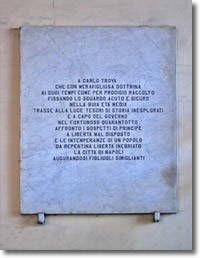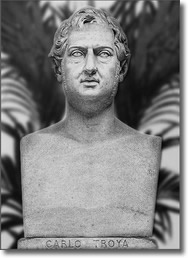Carlo Troya


- Bust of Carlo Troya - Università degli Studi di Napoli Federico II, the Saviour's Courtyard
Born in Naples, 7 June 1784. Began his studies at the Chinese College (the beginnings of what was to become the università degli Studi di Napoli l'Orientale) and continued in Palermo, the city where his family had taken refuge after the sovreign's flight from the short-lived Neapolitan Republic.
Two years after his return to Naples with his parents in 1802, he graduated in law and in 1820 undertook the office of intendant in Basilicata.
Involved in the revolutionary movement of1820-21, in 1824 he was exiled and it was during this period that he began his profound study of Dante's poem. Two years later, he returned to Naples but decided to lefave immediately afterwards, staying first in Florence, where he made friends with Giacomo Leopardi, and then in Rome.
He returned to Naples for good in 1840. Together with Saverio Baldacchini and Rggero Bonghi, he founded a newspaper, Il Tempo, with a national outlook and used its columns to support the sending of a neapolitan expedition to the first war of independence.
After King ferdinando II of Bourbon conceded the Constitution, he accepted the office of Presidency of the government Council constituted on 3 April 1848; he still held this office when the stirrings began in the city on 15 May.
When he retired from the political scene, he was able to dedicate himself to his studies until his death on 28 July 1858.
His writings include Dante's Allegorical del Veltro (1826) and the history of Medieval Italy (1839).
Area Cultura e Turismo Servizio Beni Culturali - Archivio Storico Municipale
Salita Pontenuovo, 31 - 80139 Napoli
e-mail: archivi.storici.biblioteche@comune.napoli.it
pec: archivi.biblioteche@pec.comune.napoli.it